PAST ISSUES
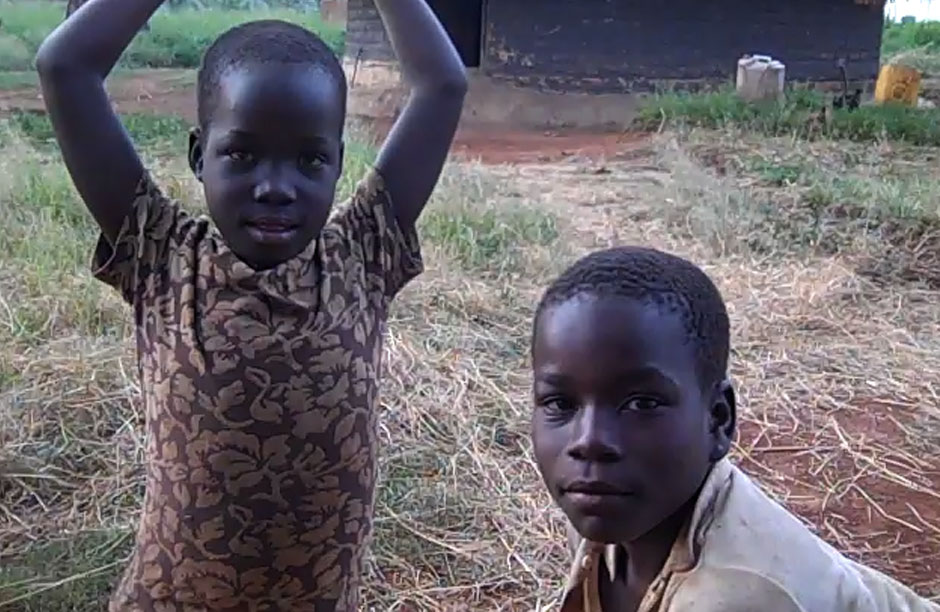
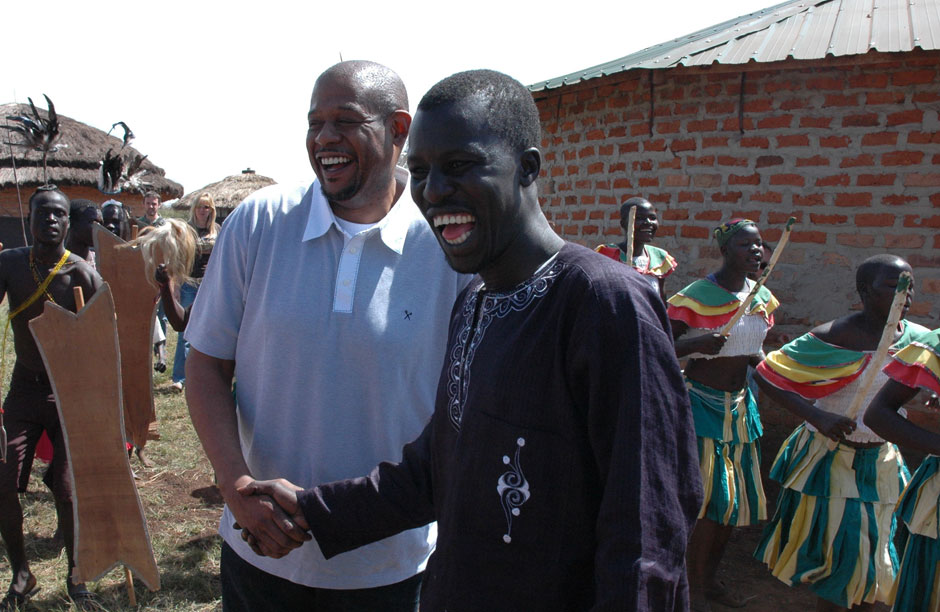 Forrest Whittaker (Left) with Okello Sam founder of Hope North campus for child soldiers and refugees in Uganda. Okello was Whittaker's acting coach during the making of "The Last King of Scotland".
Forrest Whittaker (Left) with Okello Sam founder of Hope North campus for child soldiers and refugees in Uganda. Okello was Whittaker's acting coach during the making of "The Last King of Scotland".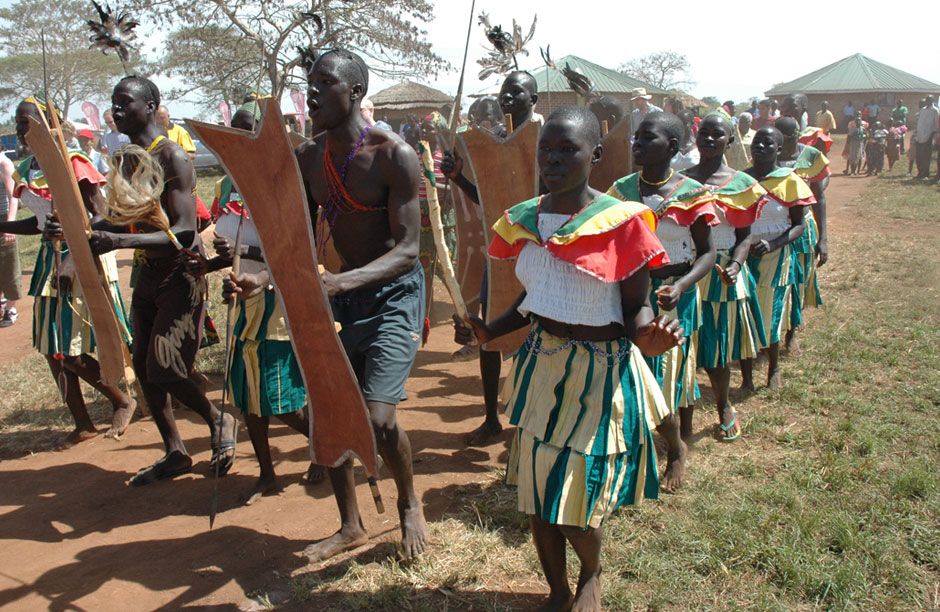 Part of Hope North's approach to healing is through dance, performance, and artistic expression. Here the Hope North students perform for visitors.
Part of Hope North's approach to healing is through dance, performance, and artistic expression. Here the Hope North students perform for visitors.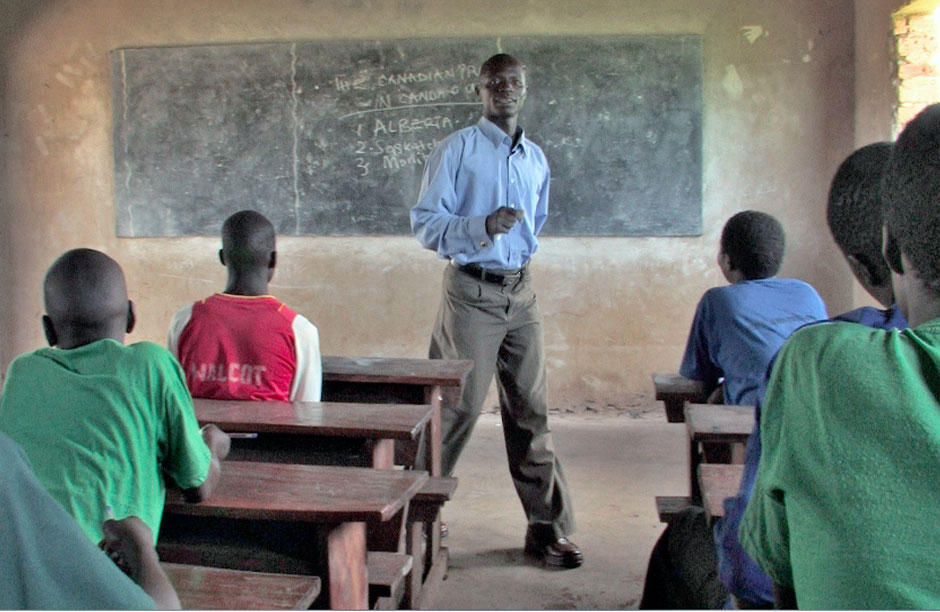 A Hope North classroom
A Hope North classroom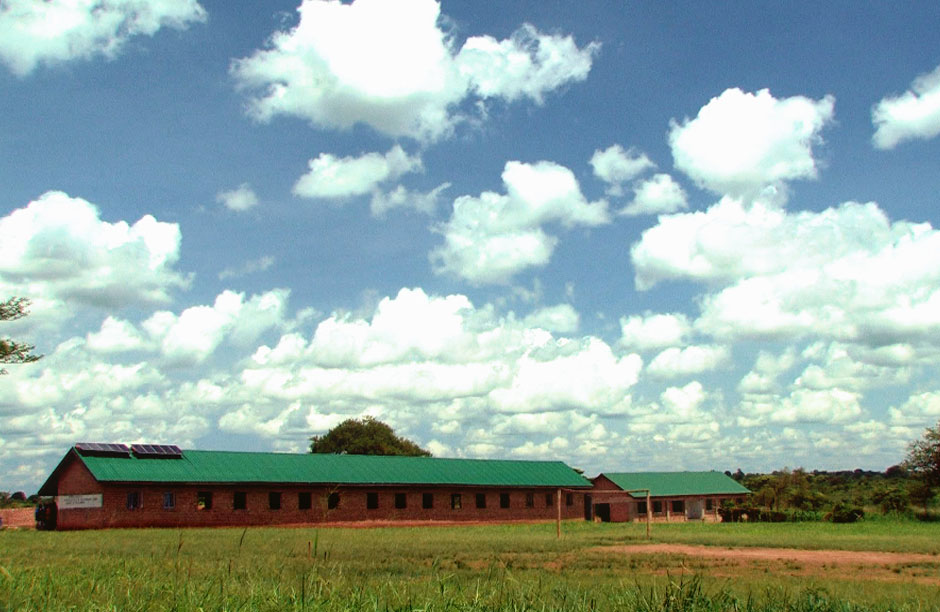 The Hope North campus in Northern Uganda - a sanctuary for boy soldiers, orphans and refugees of the Ugandan civil war.
The Hope North campus in Northern Uganda - a sanctuary for boy soldiers, orphans and refugees of the Ugandan civil war.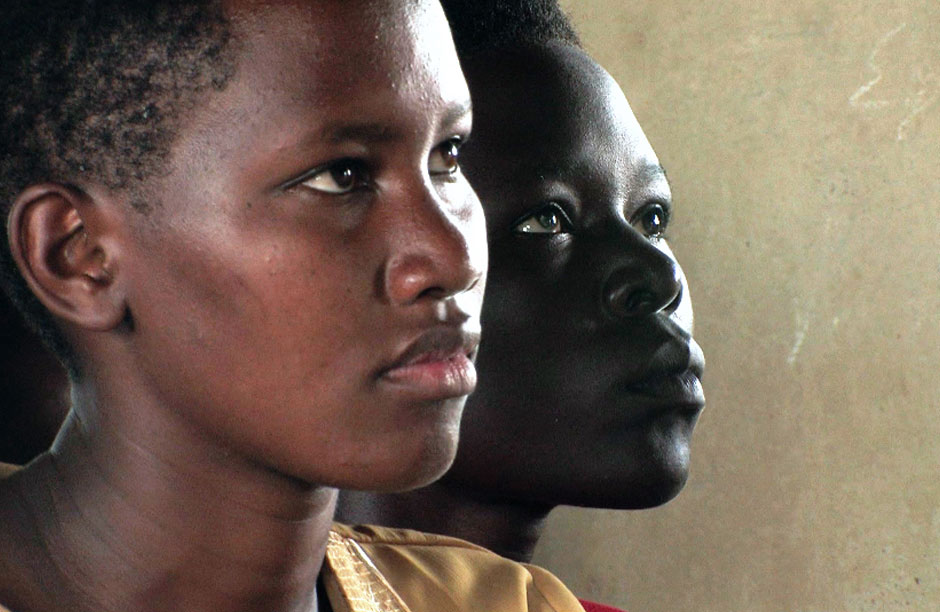
To Heal a Warrior’s Heart
By Jason HamiltonIn northern Uganda, tens of thousands of children have been abducted to serve as soldiers in a brutal civil war that has raged for the past two decades. The war has made orphans and refugees of many, with 1.6 million Ugandans forced into overcrowded camps. Doctors Without Borders named the conflict in northern Uganda one of the top ten most underreported humanitarian tragedies.
Hope North is a 40-acre campus in northern Uganda where 210 refugees, orphans and escaped child soldiers find a place to call home. Hope North students receive medical care, nutritious meals, opportunities to heal through the arts, community, and a first-rate education. In 2008-2009, 54 students qualified for the national exams, and 6 graduating seniors are going to University.
Hope North was created by Sam Okello, a successful Ugandan dance and theater choreographer to give education, vocational training, healing and hope to some of these young victims so that they might play a positive role in Uganda’s future.
Okello was directly effected by the war in the north. At the age of 14, Okello and his brother Godfrey were abducted, trained as child soldiers and forced to fight. Okello managed to escape, but Godfrey was killed by rebels. To honor Godfrey, Sam purchased a large tract of land to serve as a sanctuary for youth in peril, and on which to build Hope North.
Most of the students at Hope North have lost friends or family members to AIDS, and some students have contracted the virus themselves through war atrocities. Hope North tests all students. Those who test positive for the HIV virus receive medicine and treatment through Hope North’s on-site clinic.
“Hope North is a much-needed sanctuary for young people whose lives have been stolen by a brutal civil war. I hope you can join me in creating opportunities for these terrific kids.”
– Forest Whitaker
Canada-based writer Jason Hamilton interviews Okello Sam and filmmaker Kief Davidson, producer of “Kassim the Dream”, the story of Kassim Ouma, a former boy soldier that became Junior Light Middleweight Champion of the world. But, it was Jason’s correspondence with a student from Hope North that gave him a new perspective on being a father, and on the need to nurture the hope of Dustin, his own child’s future even in a peaceful and prosperous nation like Canada. He passes the lesson on to his son.
Dear Jason,
My name is Ajok Kevin. My village is Akwara, along the highway to Kitgun. It is surrounded by Mango trees, and is beautiful all around.
What happened?
In 2002, Hope North provided me with everything I needed. I felt safe. It made my life complete because I could study, sleep well, and eat well.
When I first came to Hope North, my mind was unsettled. In Uganda, many children are abducted or hide in the bush where you don’t even have food and are without any hope. Hope North helped me very much in finding a community to be a part of and a place to forget about the northern war.
It was my choice to go to Hope North. I wanted to study, but also the name attracted me – that they had a feeling for the children suffering in northern Uganda who are in need of hope. I didn’t have money for schooling fees, but Hope North offered to sponsor me.
In 2008 I was able to finish my primary level and my A-level certification thanks to the help of my teachers. I decided to stay a little longer because of my friendships with the students and teachers. During this time, the teachers helped advise me for my future plans.
I hope to be a teacher too. Currently I’m training in a teaching course at National Teacher’s College with a focus on education. I am also thinking about taking another course in either accounting or business management when I am finished.
Now, my younger brothers and sisters look to me for help, and I help them with their studies and introduce them to the possibilities in the world.
If the northern war stops completely and the younger generation are brought up well, I believe with what they saw and what is happening, they will come with better ideas for developing Uganda. By encouraging the younger generation to study, I believe we can do something productive for the future of Uganda.
I still miss Hope North very much. My friends became like family, and I also miss my teachers. I miss everyone very much.
Sincerely,
Ajok
Dear Dustin,
I promise I’ll do my best to not be that Dad. You know, the Dad that boasts how it was so much better when he was a kid. Your childhood won’t ever be better or worse than mine, but yours will be different, different for a lot of reasons. Your mom and I are going to do our very best to let you be yourself. That’s not to say we won’t try to challenge you with athletics, education or artistic notions. But it won’t be our sole mission to fill all of your waking hours chaperoning you from one task to another in constant pursuit of achievement.
In North America we’ve become obsessed with achievement and success. It’s filtered down into how we interact with one another, but more importantly, how we raise our children. Every well-intentioned parent wants the best for their children. It’s natural. But is it well serving to drill your child to learn five languages before they’re ten years old? Will nursery rhymes be replaced with calculus at the singing circle? The evidence is anecdotal, but a few years ago a prominent school board had to hire a special roving instructor to teach kids’ how to play recess games like hop scotch, duck, duck, goose and dodge ball. Why? Because somehow those timeless games were lost by a generation of children with no concept of how to entertain themselves.
I spoke to Sara Lee Lewis from the Mermaid Theatre. She travels with a troupe that performs for kids all over the world. She laughs at the ‘helicopter parents’ who hover over their kids’ lives. Her goal is to allow her audience to enjoy the story telling experience. To laugh, clap, sing and dance. And most importantly, she says, “I enjoy watching children get to be children for an hour.”
But parent’s aren’t the only one’s at fault. Some of the very things that bond people, cultures together, give our lives meaning, has become a commodity for consumption. Sara Lee Lewis also said, “You know there’s a problem when kid’s are listening more to Britney than they are to Raffi.”
Art is a thread. For our emotions. Our journeys. Trials. Tribulations. Unfortunately, we’ve become too consumed with the pace of our lives to take notice.
A new friend of mine crystallized this view perfectly. He said, “The world is round. When you walk, no matter where you go, you always end up where you started.” That man knows the binding power of art. His name is Okello Sam. He is the former Artistic Director of the world famous Uganda Ndere dance troupe. He is also the founder of Hope North, an accredited secondary school in Northern Uganda that’s very purpose is to use theatre, art, dance and music to heal the emotional and psychological wounds of former child soldiers.
Is art the only way to repair a damaged human soul? No. Sports and athletic competition can also be a powerful means to overcome obstacles. Kassim Ouma, the subject of documentary filmmaker Kief Davidson’s ‘Kassim the Dream’ is an inspiring example of how the human spirit is able to overcome very difficult circumstances when a goal has been set in motion. Himself a former child soldier, Kassim defected to America from the Ugandan army. Alone, homeless in a foreign country, he somehow managed to become Junior Light Middleweight Champion of the world. Through sheer force of will he achieved his goal. But in many respects, Kassim is also demonstrative of the pitfalls that come after the goal or the achievement has been accomplished.
Having won the championship, the government allowed Kassim to return to his home and family. Shortly after he returned to Uganda he lost his title. From having spoken with the film’s director, Kief Davidson, the pain of Kassim’s traumatic life was never addressed by the man himself. However, the prominent props, the drugs, the alcohol, that he needed to cope were more than partially responsible for his failed conditioning in subsequent matches. His age and present situation has his boxing career very much in doubt. As is often the case when intense focus has seen you through all obstacles, vanquished all foes, and in this case, achieved the pinnacle of your sport (a boxing championship) the question then becomes…..now what?
Sometimes having the fortitude and perseverance is only a means to be able to delay, to distract from the real emotional healing- the intrinsic honesty- that needs to happen in order for a human soul to be able to heal itself.
The journey to emotional health begins at home. Within. This is where Okello Sam starts. There is no magic formula, no quick fix. It comes with an embrace that whatever the events, whatever the trauma, it is not the fault of the child. For whatever the child has been witness to, or participant to, is irrelevant. No child is judged.
No matter the circumstances, Okello takes the child in and has them know first and foremost that they are loved: Absolutely and unconditionally.
From there, Okello says, the children are rewarded with joy.
After they have found a family within the school community they are given every opportunity to sing, to dance, to begin to find a way to express themselves. They are allowed the right to be children once again. As time, comfort and security seep into their emotional lexicon, they are encouraged to express their emotions and know that no matter what, they are valued. No one is superior to them.
It all seems too simple, doesn’t it? Okello is quick to point out this process takes place over weeks and months and requires a great deal of patience. And not always is he able to get through to every child that walks onto his land. However, in the ten years since he founded the school, roughly 1,500 to 1,700 students have graduated and gone on to rejoin their communities and families. Not only does the school focus on the emotional trauma they need to center themselves’, their talents and abilities’ are addressed with a practical educational element to help them secure employment after graduation.
This is the path I must walk with my own son. It’s easy, sometimes too easy, to get caught up in competition with others’ as a means to measure your own success, and even easier to vicariously live it out through our children. I acknowledge that and will do my best to let you be you. To walk with you as you seek your own path, pat you on the back when you need it and kick you in the rump when it’s equally necessary. From there it’s up to you. I will do my best to support you and give you all the tools to live your own full life.
Sincerely, your loving father,
Jason Hamilton